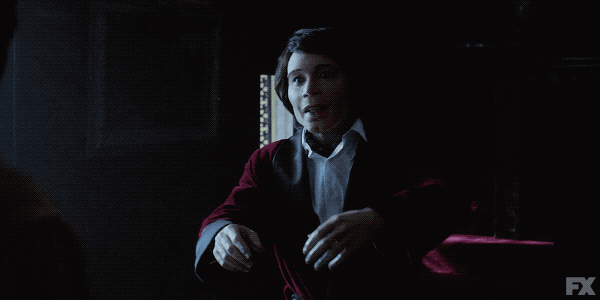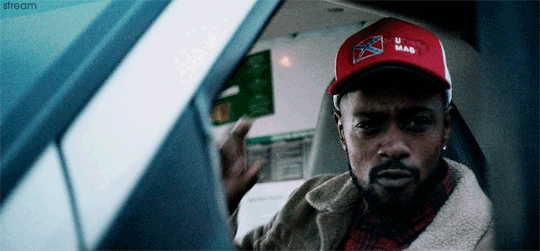
There’s a bubble of gentrification and un-self-awareness that exists in Atlanta proper that bursts in a really unflattering way when you get outside the perimeter. That bubble is called Southern Gothic. We don’t see it too much on film. Typically it manifests in novels and short stories of the 1930s-50s: the term is mainly affixed to such authors as Flannery O’Connor, Carson McCullers, Harper Lee, Tennessee Williams, and especially my main man, William Faulkner.
Lots of shit classifies this genre, but the main, heavy-hitting qualities that “Teddy Perkins” revisits are these:
attachment to a house (typically a plantation house)
warped or disturbing characters (typically Civil War veterans or those who witnessed its atrocities)
fixation on the grotesque or macabre and its aftermath
These qualities beat all around the main point. Like, glaringly, obviously circling it like sharks circle prey. The Southern Gothic never mentions slavery. Never outright. Almost never. It at least never really presents it as a problem. But that’s really all it discusses. And did you notice? Nearly all writers of the Southern Gothic genre (that we currently recognize as canon) are white. Which is another problem. Wait, no, here I go: it’s not another problem, THAT IS THE PROBLEM.
So imagine my delight when I turn on my favorite new show Atlanta, and see Darius (played by LaKeith Stanfield, who is perhaps my one true love) renting a U-Haul at a hardware store and driving that shit straight out of town and into the pine trees.
Darius is the most woke of the characters on Atlanta, which in this context means that he understands situations on an intuitive level that is, to be frank, motherfucking astute. When Alfred/Paper Boi (played by Brian Tyree Henry) advises him to get what he came for and leave the house, Darius says, “I see what you’re saying. I see what you’re saying. You’re saying be unequivocally honest to make a healthy transaction” (16:08). Yep. Yep, more or less that’s what he was saying.
Alfred’s the one who is worried about him getting murdered by Michael Jackson’s doppelganger—and I’m sorry, but if you didn’t SEE Teddy Perkins and stutter in a panic, “Michael Jackson’s ghost!” where were you at for the last twenty years?

So let’s take this shit in stride.
1. Grotesque Characters
Teddy Perkins. He’s grotesque in the same way that we remember Michael Jackson as grotesque—not because of his music. His music is what we as a culture have decided to remember. As a culture, we decided to forget his strangeness in favor of the good he did for the world, and I understand that. I really do. I understand that bad people can do good things. I’m not calling Michael Jackson a bad person, I’m calling him grotesque: he hosted sleepovers for children. He received surgeries to render his body unrecognizable in reference to his former appearance. He bleached his skin.
Regardless of his reasons for doing so (I do not claim to know his reasons), they’re weird enough that we’re still satirizing them. Look at Teddy Perkins (played by Donald Glover… I think? And Atlanta’s wildly talented prosthetic and makeup team).

His appearance alone is off-putting enough, but then he puts out BOTH hands to shake Darius’, invites him into the parlor to watch him eat a soft-boiled ostrich egg, and records reminders for himself, including, but not limited to, “Wash your hands… IMMEDIATELY” (10:20). What the fuck?
Darius has a similar reaction: “Yeah, I can’t sit next to this” (11:10).
When he calls Alfred/Paper Boi, they compare him to a litany of grotesque characters… just look at this tweet—YES TEDDY PERKINS HAS A TWITTER HANDLE!

When Alfred asks how bad it is, Darius says, “It’s REAL bad, man. I mean, BAYUD. The n— look like somebody left Sammy Sosa in the dryer” (15:26). And when they see the picture he references (of Sammy Sosa, formerly dark-skinned Dominican baseball player who has bleached his skin white), Alfred yells, “OH SHIT. OH SHIT. WHAT HAPPENNNNNNED” (15:23).
But Darius really wants that piano. Even though his friends tell him not to go back into the house, he goes back into the house. He has, after all, a “two regret life limit pact” (14:44).
2. Attachment to a House
Not only is Teddy Perkins attached to his house, but he can’t leave it, or at least his brother, “Benny” can’t leave it, and Teddy has to take care of Benny. Darius says, in a moment of fascination and bewilderment at the uncanny situation he’s in, “I don’t think Teddy even exists. I think Benny invented Teddy to make up for the fact that he made himself look like a ghoul” (13:25). Although the audience is led to believe that Benny may be dead in a nice Hitchcock-Psycho homage, may have never existed, or may be Teddy’s alter-ego (Psycho again!), the ending of Atlanta shows that everything Teddy said to Darius was more or less true. Benny can’t leave the house because he has a skin condition in which his skin can’t process sunlight.
We never actually see Benny’s skin, by the way. He’s completely covered head to toe, head to fingers. We see Teddy’s skin, though, and it is porcelain white, stretched to its full elasticity over reconstructed cheeks, nose, and jaw.
Just to remind you, in the photos that Darius sees in the house, the Perkinses are Black. And yet.
And before you say, No, Mary Kay, this weirdness doesn’t have anything to do with race, remember first that a staple of the Southern Gothic genre is to reference without directly acknowledging the historic, generations-long suffering of Black people. And second, remember the cold open:

And I’m not saying that everything that happens happens because the characters are Black. But that shit happens, and they are Black. (To reference a sit’s sort of like saying the Armitages in Get Out might not have been racist. OKAY BUT THEN WHY WERE ALL THE VICTIMS BLACK. That’s a coincidence?)
Regardless of if you prefer to claim causation or correlation only, Teddy Perkins experiences a lot of self-loathing, which makes him not only a doubly grotesque character, but it also manifests in his house itself. When Darius comes back inside after talking to his friends on the phone, Teddy takes him into the gift shop he’s curated… and then he takes Darius into the museum.
The museum is dedicated to Teddy and Benny’s abusive father, whom Teddy does not view as abusive. Darius does, though—and Darius is our new generation, the narrator whom we typically need to put the Southern Gothic FUBAR nonsense into perspective.
Essentially, we need that narrator so when we see some fucked-up shit go down, we can turn to someone and be like, “That shit was fucked up, right?” In Absalom, Absalom (Faulkner), we get Quentin, who even though he has SOME perspective, has no fraction of the self-awareness and conviction that Darius has.

The house—and the piano—play a large role in the climax and resolution of the episode, too: the phantom elevator takes Darius down to the basement, and the basement is where Darius finds Benny, and Benny sends him up to the attic to find his gun because he thinks that Teddy will “kill (them) both." But I’ll come to those points in a minute.
3. Fixation on the Macabre
When Teddy talks about his abusive father with reverence, Darius says, “Are you not mad at your dad?” in disbelief. Teddy responds, “Of course not,” and says that it was he who didn’t understand. How could a child understand discipline? (But that’s the thing, right? If a child does not understand why they are being punished, it’s not a punishment: it’s abuse.)
Darius even tries to clarify, “So your dad used to beat you to be good at the piano?” As we see with the conversation with Alfred from before, Darius is able to distill significant information with very little input, and we can tell he tries to be empathetic, to act as the audience would like to react, as he does later, when he shares his own story of childhood abuse...but Teddy doesn’t see it that way: “To be good at life,” he says. “We were a sacrifice” (19:50).
Darius, however, does not give in. He tries to empathize, but he knows that Teddy is wrong, and wants him to know that he is wrong. He says, “I’m not trying to shit on your dad or nothing, but that seems a little… unnecessary” (20:40).
Teddy goes on to say that wing of the museum is dedicated to all great fathers, including, his father, Joe Jackson, Marvin Gaye Sr., Tiger Woods’ father, Serena Williams’ father… all of whom AT MINIMUM gave their (Black) children a far-too-intense training schedule. Granted, the children are all prodigies, but at what cost? I mean, Marvin Gaye Sr. literally shot and killed the prodigy he helped create. The fixation on the macabre in the “Teddy Perkins” episode of Atlanta is not the normal Southern Gothic trope of ignoring the horrors of slavery. The fixation on the macabre in this episode is ignoring the horrors that Black entertainers have had to endure so that the general population could be entertained.
Part of this enduring seems to me the self-loathing that manifests as body dysmorphia and/or the complete revamping of one’s physical appearance as a result of trauma. Could Benny be sick? Absolutely. Could Teddy be sick? Definitely. Did Teddy’s skin turn white? Yes. Did he make it turn white? We don’t KNOW know, but judging by the alterations to the rest of his appearance, probably. This changing-of-appearance happens to many adults who suffered childhood abuse, in real life. It does not necessarily have to do with race or ethnicity directly. Race and ethnicity are merely the legacy of the Southern Gothic archetype that this episode comments on.
In maybe the most jarring lines of dialogue, Teddy explains that Benny does not like to be seen “that way.” Darius, forever empathetic, says, “I can imagine—” but he is not allowed to finish. Teddy shrieks at him, “NO YOU CAN’T” (22:04) and that’s the whole point.
Really, no one who has not been through whatever horror the grotesque characters exhibit can ever imagine it accurately. Being entertained at the expense of those horrors, according to this episode, is not good. After all, Teddy stages a home invasion. This concept alone references attachment to the house, grotesque characters, and of course a fixation of the macabre. All this effort goes into mercy-killing Benny, putting him out of his misery.
And yet. Benny triumphs over Teddy. And then Benny takes his own life. And then Darius goes home, unhurt but not unaffected. He understands the story as best as anyone can, and that’s why he’s our narrator—or if not exactly our narrator, he is the way that the viewer interacts with the narrative. Darius is how we are supposed to interact with grotesque natures that most of us do not understand.
After I watched “Teddy Perkins,” I could not stop thinking about it. This episode was especially hard for me to untangle as a viewer, which is, obviously, why I felt like I needed to write about it. What did I miss? What do you think?
Atlanta is available to view on FX.